- Home
- Winston Groom
Kearny's March Page 2
Kearny's March Read online
Page 2
The immediate grievance in the North over war with Mexico was a fear that if the nation added Mexican territory in the Southwest it would mean loss of northern political power to the southern “slave power,” which would move to occupy the new lands with their slaves. Up to now, a delicate balance in the U.S. Senate had been maintained between the two sections of the country—eleven southern states and eleven northern—so that a workable if uneasy balance had been achieved.
In 1821 Congress had forged a bitter settlement allowing Missouri into the Union as a slaveholding state—the Missouri Compromise—brokered by Henry Clay of Kentucky, in which slavery was henceforth banned north of the southern Missouri boundary line. For twenty-five years this had worked to keep the dangers of sectional politics at bay. Until now—until Kearny’s march, a quarter century later, which threatened to radically disturb the balance created by the compromise. By this time the issue was further vexed by the growing abolitionist movement in the North, which had brought a moral dimension to the political question of slavery. This tended to produce high passions, which were inflamed when a relatively unknown congressman from Pennsylvania inserted language into an appropriations bill that would have banned slavery in any territory acquired by the United States from Mexico. That legislation, known as the Wilmot Proviso, opened a Pandora’s box that neither laws nor common sense could ever close.
Kearny of course knew little or nothing of this. His immediate task was to get to Santa Fe with his army and put the Mexican authorities (namely one Governor-General Manuel Armijo) out of business.
Meanwhile, draped wretchedly along the banks of the Missouri River from what is now Omaha to Council Bluffs, nearly seven thousand of God’s “chosen people” huddled starving and freezing and awaiting their chance to move west. They were Mormons, of the Church of Jesus Christ of Latter-Day Saints, whose unusual beliefs habitually caused them to be driven away—often violently—from wherever they tried to settle down. But now they were leaving the United States, or so they thought, for what was identified on most maps as “Unorganized Indian Lands” that had been portrayed so enticingly by the explorer John C. Frémont in his recently published journals.
A significant hurdle, however, was that the Mormons had no money to get there. Their leader, Brigham Young, had approached President Polk for funds, on the basis that the government was responsible for ensuring that such a large number of citizens could have a peaceful place to live without being attacked all the time. Polk responded that the U.S. government was not in the business of handing out travel money to religious sects but then, seeing as how war had just broken out with Mexico, he offered to provide good military pay to five hundred Mormon men if they would form a battalion and march to California with Kearny’s army. This offer was accepted, and the Mormon men began to assemble themselves at Fort Leavenworth for the long trek ahead. For his part, Polk was glad the Mormons were clearing out—the farther west they moved, the better. If only somehow he could get the Irish to go with them.
Two hundred miles south, in mid-May of 1846, a different kind of emigrant party was poised at the jump-off point at Independence, Missouri, beyond which lurked hostile Indians, barren plains, searing deserts, insuperable mountains, and a thousand other dangers known and unknown. These were the families of George and Jacob Donner and James and Margaret Reed, who a month earlier had left their own prosperity behind in Abraham Lincoln’s Springfield, Illinois, and saddled up for the long haul west. Most of the early pioneers were hardscrabble and had undertaken the treacherous journey because they could see no future at home, but the Donners and the Reeds were substantial folk, so the irony remains that if only they’d stayed put and tended to business, the horrors that overtook them would not have happened.*
Like many of the other emigrants, Reed and the Donner brothers had immersed themselves in Frémont’s appealing recital of the golden West and concocted their own dreams, some of epic magnitude. They had also read a popular new book by a young adventurer named Lansford W. Hastings, who had made several trips to California and who was touting a new, shorter route south of the Great Salt Lake. It was said to take hundreds of miles off the old Oregon Trail, and would come to be known infamously as the Hastings Cutoff.
By publishing this handbook Hastings was thought to be an expert on California, but in fact he was more of a Babbitt-like booster, a salesman aspiring to attract settlers to the Golden Gate where—as Sam Houston had done in Texas but with none of Houston’s cachet—he intended to provoke a revolution and turn California into a separate republic, with himself as president, king, dictator, or whatever. The fact was that while Hastings may have traveled his so-called cutoff he had done so on horseback with pack mules, not with the large, burdensome, ox-drawn wagon caravans that the settlers traveled in. It was dangerous—deadly, as it turned out—not to have drawn the distinction.
The people in this story, Frémont, Kearny, the Mormons, and the Donners, were all going places in 1846, which has been rightly memorialized as the Year of Decision. Departing the Kansas frontier, the farthest bastion of civilization, they plunged into the savage wilds in different directions and for different reasons, like the vast hordes of emigrants, American and foreign alike, who would follow them, but nevertheless they were all headed in the same way, which was westward.
Fifty years down the road a respected historian named Frederick Jackson Turner became famous by formulating a thesis about their migration, which he entitled “The Significance of the Frontier in American History.” Turner attempted to quantify the pioneer expansion scientifically, in the manner of Darwin—a notion that now sounds quaint—to account for American exceptionalism.
If Turner had chosen to focus on the year 1846 he would have hit the jackpot. It had taken 250 years for the frontier to creep from the Atlantic colonies across the Alleghenies, and westward again across the Mississippi, about nine hundred miles in all. But by the 1840s a cyclone of events and conditions had whipped up a stupendous westward shift, fueled by the recent arrival of so many Europeans who were raised in places where land ownership was all but impossible. It was becoming that way, too, for many Americans: cotton, tobacco, sugar, hemp, and other cash crops had driven up the price of land while at the same time wearing out the soil, but word was out through Frémont and others that the West offered bountiful land for the taking—and with it the chance to begin a new life, free of persecutions and restrictions. The pioneers accepted the challenge. Some, like the Mormons, were fleeing from everyday Christian opinion that was pushing and threatening them. Others succumbed to population pressure; for still others, the new frontier drew them out of their old land to a new land with smiles and waves and endless promise.
And as the pioneers made this great leap, historian Turner postulated, they soon discarded many of the European characteristics and institutions that had been culturally ingrained since colonial society and developed for themselves a distinctly new American personality characterized by rugged individualism, tenacity, suspicion of authority, mistrust of government—to put it bluntly, they became less civilized. Much of this was doubtless true, considering the hostile and violent environment they had entered, and goes far in explaining why, for example, mountain men often scalped their slain enemies, same as the Indians did.
Whether Turner’s thesis can be sustained is a matter of conjecture. By the turn of the nineteenth century the days of the frontier had passed, and other elements began to infiltrate and make an impact on the American psyche. But certainly today there are still important features of the national spirit that were driven by and molded from the frontier mentality.
Kearny’s march is more than just a metaphor for the great western advance of 1846; it was an astonishingly difficult, daring, and heroic adventure within an overarching movement, led by Frémont and his fellow explorers and including the trek of the Mormons and the Donners and other wagon trains inexorably bound to cross the continent’s last earthly frontier—a voyage that ultimately shaped the exten
t, affluence, and character of the United States of America.
* While it was true that the majority of emigrants were running away from poverty, 1846 was also the first year that a notable number of professional men—lawyers, doctors, clergymen, and writers—made the journey to the Pacific.
CHAPTER TWO
Mr. Polk Gets His War
By the 1840s, America was writhing with energy and excitement propelled by two interlocking concepts that would tear the country apart twenty years on. The first was African slavery, which had reached American shores more than two hundred years earlier on a Dutch ship that arrived in Virginia with the first few of some 645,000 tribal Africans who were originally distributed throughout all thirteen colonies, and later, after the Revolution, in the various states. But by the early 1800s further importation of slaves was made illegal by an act of Congress, and northern states began to abolish the practice, freeing their slaves or selling them for servitude in the South.
This left the balance of the bondsmen, nearly three million of them by then, confined in the thirteen southern states, and mostly occupied in the cultivation and production of sugar, tobacco, rice, and foremostly cotton. By the 1840s a small but vocal organized abolition movement from the North was haranguing for their release; this, in turn, began to create a dangerous friction between the two sections of the country.
The second concept roiling in the minds of many Americans was what a New York journalist named John O’Sullivan had recently described as “manifest destiny.” This notion embodied the belief—some even claimed it as a divine right—that U.S. citizens should accrete westward across the entire continent, spreading their culture, their economy, and their rule. Never mind that there remained a great number of Native Americans populating those vast regions since time immemorial, and also that the lands in question—from Oregon to Colorado, from New Mexico to California—were claimed by long-standing entitlements to the governments of Mexico and Great Britain. Nevertheless, according to the theory, manifest destiny trumped all.
Into these interesting and risky times, when U.S. congressmen were fighting duels over the slave question and ordinarily sane and sober citizens were running around shouting “Fifty-four Forty or fight!,”* stepped the newly elected U.S. president James K. Polk, who took office in March 1845. At forty-nine, Polk became the youngest president yet to assume office, an event that seemed to set off tremors reverberating to this day among historians who routinely describe him as a misanthrope who “didn’t like people,” or much of anything else except “politics.” They saw “a tendency toward quick and rigid judgment” somehow reflected in his “probing blue eyes deep-set under dark brows” and a “narrowness of outlook” in his “powerful jaw that jutted from his countenance.”
Just to show that the political climate then wasn’t any better, and possibly worse, than today’s unhappy partisanship, the opposition political party branded Polk in speeches and newspapers as “bland,” “cold,” “unimaginative,” “strait-laced,” “mediocre,” “conniving,” and “mendacious,” and their electioneering slogan was a scoffing: “Who is James K. Polk?”
All right, just who was James K. Polk, the eleventh American president? The question is important because without him the citizens of Houston, Dallas, Los Angeles, San Francisco, Denver, Salt Lake City, Phoenix, Las Vegas, and points in between, would today quite possibly be governed by a regime in Mexico City, and the good residents of Seattle, Cheyenne, Boise, Butte, and Portland might likely be, well, Canadians. Those were the stakes, and stakes were high, even considering that many of these aforementioned place-names existed just barely or not at all when James Polk took office.
But the man Polk had a vision of America, as did his mentor, Andrew Jackson, that was as sweeping as the great prairies of the West. He saw the nation as a grand expanding panorama filled with appalling risks and soaring promise, and with wealth and happiness as its God-given design. For all the blandness and unimaginativeness his detractors laid upon him, Polk saw an America from coast to coast, where many others saw only a vast uninhabitable wilderness, and his instincts told him that if he did not act it would likely be lost to the United States for the foreseeable future and possibly for all time. But the mere mention of attaining new lands from Mexico and creating new territories or states immediately caused trouble. Not only would such acquisitions be nothing less than outright thievery—“the biggest land-grab,” in fact, said one, “since the czar took Siberia”—but, worse, they would lead to an expansion of slavery.
Polk was a transplanted North Carolinian whose fourth-generation Scots-Irish family in 1806 moved across the Appalachians to middle Tennessee—which was then considered to be the American “frontier”—when he was eleven. The Polks had come to America in the late 1700s, among the first great immigration since the landing of the Massachusetts Pilgrims and Virginia Cavaliers a century earlier, as one of the many British families who arrived in the mid-Atlantic states to escape the poverty brought on by imperial policies in the British Highland regions. These Borderers, as they were known, brought with them skills in farming or mechanics and the ethic of hard work, self-sufficiency, and independence and years later would form the core of soldiery in the War of 1812, the Mexican War, and, of course, the Civil War.
The Polks were farmers, like most southerners of the day, and once in the fertile bottomland of Tennessee soon went into the cotton-growing business along with their neighbors, among them Andrew Jackson. Since cotton required slaves, they began acquiring some. Over time the Polks—there were half a dozen families of Polks in and around Columbia, Tennessee—began to prosper and erect elegant plantation homes on or near the fertile Duck River. James’s father prospered even more by engaging in land speculation, was elected a county judge, started a bank, and became close friends with the towering Jackson, who would soon be off on his own wild political ride.
Apparently Polk came by his political conservatism honestly; the Polk clan, James in particular, were committed Jeffersonians, opposing Alexander Hamilton’s notion of a large central government, high tariffs, and the spending of citizens’ tax money on “internal improvements,” which were what government projects such as roads, canals, river clearing, and the like were then called.
At an early age, young James endured a life of ill health, which kept him frail and fraught with abdominal pains. These were eventually diagnosed as urinary stones, but the state of medicine being what it was a cure was risky and far from certain, and until the age of seventeen he endured his ailment at home, with little or no formal schooling. Finally, in 1812, the pain had grown so acute that his father sent him to Philadelphia to a well-known surgeon. It was an eight-hundred-mile trip in the back of a covered wagon over potted roads, but scarcely had his caravan entered Kentucky than James was seized by a “paroxysm” so terrible that it was decided to find a surgeon immediately rather than continue on to Pennsylvania.
The man they selected, Dr. Ephraim McDowell, was also a surgeon of some note, but the operation was daunting, nevertheless. First, anesthetics had not been invented, so the boy would have to undergo the procedure with only some brandy to help dull the pain. A description of the operation itself, though successful, is enough to make one blanch; suffice it to say that when it was over Polk recuperated but was apparently left either sterile or impotent since he fathered no children. This last result has been used by some of his detractors to explain various of Polk’s less attractive character traits, including his mistrust and political vindictiveness.
He was, however, at last able to attend school and was enrolled in several private academies at which he excelled in Latin, Greek, mathematics, history, and the classics before finally crossing the mountains to the University of North Carolina, from which he graduated in 1818 with honors and as class valedictorian. From there he went to Nashville to study or “read” law under the wonderfully named Felix Grundy, a “giant of the criminal bar,” former congressman, justice of the state supreme court, and future
U.S. attorney general.
By 1820 Polk had completed his law studies and was admitted to the Tennessee bar, and Grundy had secured for him the job of chief clerk of the Tennessee Senate, which gave him a useful education in the parliamentary system. Those were heady days in Nashville legal circles, with not only Grundy and Andrew Jackson as associates, but Sam Houston before he gained fame and fortune in Texas, as well as a young frontiersman named Davy Crockett who had recently been elected to the Tennessee legislature. Polk also joined the Tennessee state militia—the same organization that enabled Andrew Jackson’s rise to fame at the Battle of New Orleans—attaining, in time, the rank of colonel.
The steps one takes that later bring great life-changing events are often imperceptible at the time, and so it was with Polk, in 1823, when he supported Andrew Jackson for the U.S. Senate. Though Polk probably could not have known it then, the national office soon gave the hero of the Battle of New Orleans and the Creek Indian wars widespread stature to sustain his eventual election to the U.S. presidency, and Polk as Jackson’s friend, aide, protégé, and confidant went riding right along on Old Hickory’s coattails.
The following year Jackson made his run against the dour John Quincy Adams of Massachusetts. He was leading in both the popular vote and the electoral college but then, in a move that infuriated many, the powerful senator Henry Clay of Kentucky persuaded his state’s delegation to cast its electoral votes for Adams, even though the state legislature had instructed the delegates to vote for Jackson. Thus in 1825 Adams became president instead of Jackson and the furor was only exacerbated when, shortly afterward, Adams named Clay as his secretary of state in what was roundly condemned as “the corrupt bargain.”

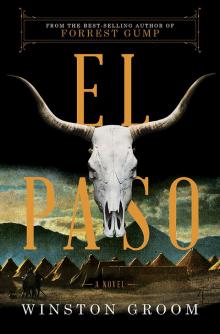 El Paso
El Paso Better Times Than These
Better Times Than These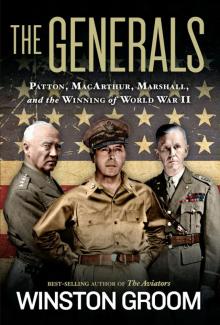 The Generals
The Generals 1942: The Year That Tried Men's Souls
1942: The Year That Tried Men's Souls Forrest Gump
Forrest Gump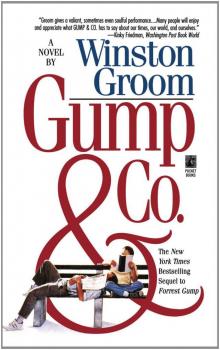 Gump and Co.
Gump and Co. The Aviators
The Aviators Shrouds of Glory
Shrouds of Glory Patriotic Fire
Patriotic Fire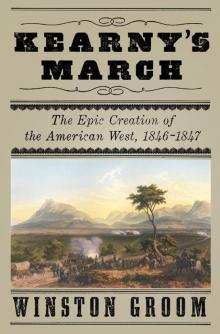 Kearny's March
Kearny's March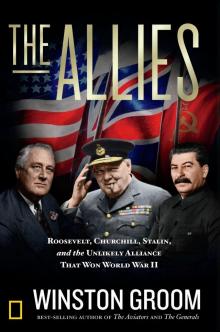 The Allies
The Allies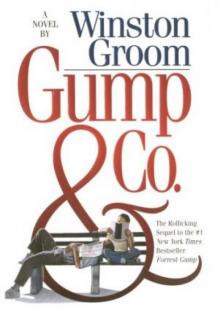 Gump & Company fg-2
Gump & Company fg-2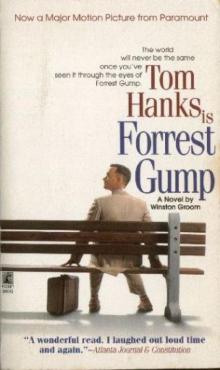 Forrest Gump fg-1
Forrest Gump fg-1 The Aviators: Eddie Rickenbacker, Jimmy Doolittle, Charles Lindbergh, and the Epic Age of Flight
The Aviators: Eddie Rickenbacker, Jimmy Doolittle, Charles Lindbergh, and the Epic Age of Flight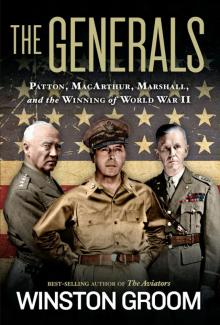 The Generals: Patton, MacArthur, Marshall, and the Winning of World War II
The Generals: Patton, MacArthur, Marshall, and the Winning of World War II